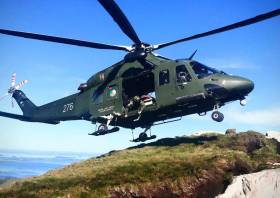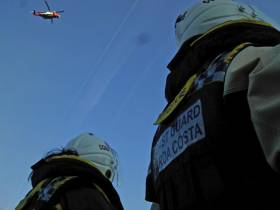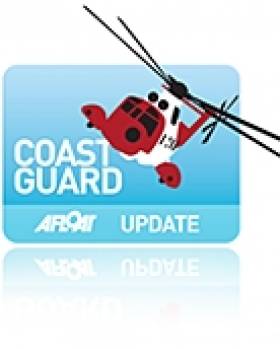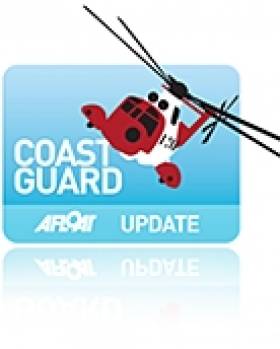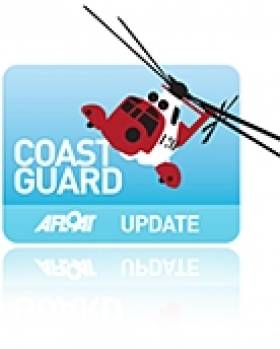Displaying items by tag: air ambulance
State To Fully Fund Air Ambulance Service in South-West
The State is to fully fund the air ambulance helicopter service initiated by a north Cork-based charity.
Maltese company Gulf Med has been awarded the contract for the air ambulance service from the end of February.
AirMed&Rescue reports that the charity, Irish Community Air Ambulance, based in Rathcoole, north Cork is to rebrand to “Critical” and will focus on expanding its ground-based volunteer emergency medical responder network.
It says it will undertake this expansion in co-operation with the National Ambulance Service.
The charity air ambulance has been tasked to more than 1,800 serious incidents and emergencies since it began flying in 2019.
Emergency air medical response is also provided by the Air Corps, based in Athlone, Co Westmeath, while air-sea rescue is provided from four Irish Coast Guard bases run by CHC Ireland.
Interviewed recently on C103 Cork Today, Critical chief executive officer Micheál Sheridan said the charity always felt it should have been a Government-funded service.
Read more here
Coastguard to Step In As State Air Ambulance Faces Disruption Over Staffing Problems
Extra pressure will be put on the Irish Coast Guard’s helicopter rescue services this winter as the State’s air ambulance plans to shut down for 16 days between now and next February.
As RTÉ News reports, “mounting staffing and training problems” will force the Air Corps to ground the Athlone-based AC112 air ambulance it has been using since 2012 for a total of 16 days — four each month from now until February.
The Department of Defence confirmed in a statement that the coastguard “will provide reserve cover to the national ambulance service” in line with the establishment of the Emergency Aeromedical Service (EAS) in 2015.
The Irish Community Rapid Response air ambulance based in Rathcoole, Co Cork will also be available “and the potential for it to provide increased support is also being explored”.
The statement added: “The priority is to provide the best service possible using all available resources during the four-day periods each month when the Air Corps are not available for EAS taskings.
“This interruption is regrettable but necessary from a safety and governance perspective.”
The coastguard’s helicopter fleet was previously trialled as an air ambulance service, and subsequently engaged in night-time cover.
But the arrangement was scaled back two years ago over concerns with pilot doing double duty for patient transfers.
Coastguard Helicopter Air Ambulance Service Is Scaled Back
#Coastguard - Irish Coast Guard helicopter crews will no longer be expected to fly inter-hospital transfers from this week, according to The Irish Times.
It’s understood that the move by the Irish Aviation Authority (IAA) to withdraw coastguard helicopters from night-time air ambulance cover is rooted in its unhappiness with the situation that saw 24-hour SAR pilots doing double duty for patient transfer.
The coastguard’s fleet of Sikorsky S-92 helicopters was first trialled as a Helicopter Emergency Medical Service (HEMS) network almost four years ago.
But HEMS rules which limit missions to pilots on 12-hour shifts with 12-hour breaks between shifts will apply from tomorrow (Tuesday 5 September).
Such overnight missions will now be taken on for the next four weeks by the Air Corps, already the primary provider of air transfers for the National Ambulance Service, using fixed-wing aircraft.
The Irish Times has more on the story HERE.
Irish Coast Guard Helicopters Trialled As Air Ambulances
#Coastguard - The Irish Coast Guard's rescue helicopter fleet is being utilised on a trial basis as an air ambulance service, as RTÉ's Morning Ireland reports.
The new fleet of Sikorsky S92 choppers will do double duty as a Helicopter Emergency Medical Service (HEMS) network in addition to their usual search and rescue requirements, following a trial period in Shannon that's set to be extended to Dublin shortly.
Some 300 HEMS operations have already been carried out this year, and Morning Ireland's Petula Martyn reports from one of the coastguard's latest, an airlift from Galway University Hospital to Beaumont Hospital in Dublin's Northside.
The IRCG has also sought permission from sports clubs nationwide to enable to the state-of-the-art S92 to land on their pitches - considerably cutting the transfer time for patients from helicopter to hospital.
Listen to Martyn's report for Morning Ireland below:
Coastguard Takes Delivery of New Chopper
#COASTGUARD - The Irish Coast Guard has taken delivery of its new search and rescue helicopter at its Shannon base, The Irish Times reports.
As previously reported on Afloat.ie, Sikorsky completed production of the new S-92 helicopter for the Irish Coast Guard last December under the rescue service's €500 million deal with CHC Ireland to revamp the aircraft fleet.
The deal will also see the coastguard's remaining four Sikorsky S-61s replaced by second-hand S-62s from Scotland over the coming months.
Training with crews at Shannon is set to begin shortly ahead of the S-92's first public demonstration at the centenary of the Titanic’s departure from Cobh in Cork Harbour.
Meanwhile, it is expected that the Air Corps may be offered an upgraded air ambulance role, after they were ruled out as contenders for search and rescue work amid some controversy.
The Department of Health has reportedly been in exploratory talks with private firms regarding the provision of an inter-hospital emergency air transfer service, as called for by the Roscommon Hospital Action Group.
The Irish Times has more on the story HERE.
Coast Guard Gets Air Ambulance Status
Helicopter crews with the Irish Coast Guard have been awarded full air ambulance status more than a year ahead of schedule, The Irish Times reports.
Under the upgrade, there will be at least one trained paramedic on board any search and rescue flight whether inland or at sea. Previously they operated at 'emergency medical technician' level.
Paramedic status allows trained crews to give injections and administer advanced techniques to clear airways or treat cardiac arrest.
Transport Minister Pat Carey, who comfirmed the move, said: "“The introduction of new technology and the improved paramedic level of care will see quite a significant improvement in capabilities.”



























